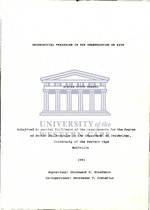Psychosocial variables in the transmission of AIDS
Abstract
In the decade since first identified, the Acquired Immunodeficiency syndrome (AIDS) has become a serious global disease. The nature of the Human Immunodeficiency Virus (HIV) that causes AIDS, whereby a carrier may be asymptomatic yet remain infectious, has enabled its dramatic spread. The number of AIDS cases is increasing exponentially, averaging a doubling time of between 8-15 months indifferent countries. Of the millions of HIV carriers, it is now estimated that all will eventually go on to develop full-blown AIDS and probably die within 15 years.
Unlike other infectious diseases, there is currently no known vaccine or cure. Further, HIV is now virtually completely dependent on volitional sexual behaviours for transmission to occur. It is therefore an entirely preventable disease. However, since the behaviours that contribute to HIV-transmission are influenced by biological, psychological, and social factors, their alteration in line with safer sexual practices has been shown to be considerably complex and difficult. Intervention strategies that have relied on imparting knowledge about the disease have achieved limited success in influencing behaviour change. Unsafe sexual practices, and the risk of HIV-infection, often continue even when knowledge regarding prevention is adequate. It has therefore become apparent that other variables intrude which may mediate between knowledge acquisition, attitude formation, and consequent sexual behaviours.
There appear to be no models which adequately explain the complexities in this area, and which enable adequate intervention strategies to be developed. The present study was undertaken to
redress this problem, and to explore those variables that mediate in the area. Various psychological and social factors appear to be implicated in influencing sexual attitudes and behaviours. In order to adequately test the impact of psychosocial variables that were found to have significant associations in an exploratory study, a measuring instrument was developed. The AIDS Psychosocial Scale was statistically validated using content, frequency, factor, and reliability analyses and included psychological factors of self concept, defenses of denial, repression, and rationalisation, perceived empowerment in the form of locus of control and self efficacy, and the social factor of peer pressure susceptibility.
The impact of these psychosocial variables on indices of knowledge, condom attitude, and sexual practices, and on other epidemiological variables was tested using a sample of students at the University of the Western Cape (n=308). Results indicated a number of correlational and causal links between variables, confirming the mediational role psychosocial factors have in influencing knowledge acquisition, attitude formation, and behaviour outcome. A profile of lower self concept, higher defenses, lower self-efficacy, more external locus of control, and higher peer pressure susceptibility emerged which was associated with poorer knowledge, more negative attitudes, and higher unsafe sex. Based on this study, a model of psychosocial mediation is developed and its implications for intervention strategies discussed.

